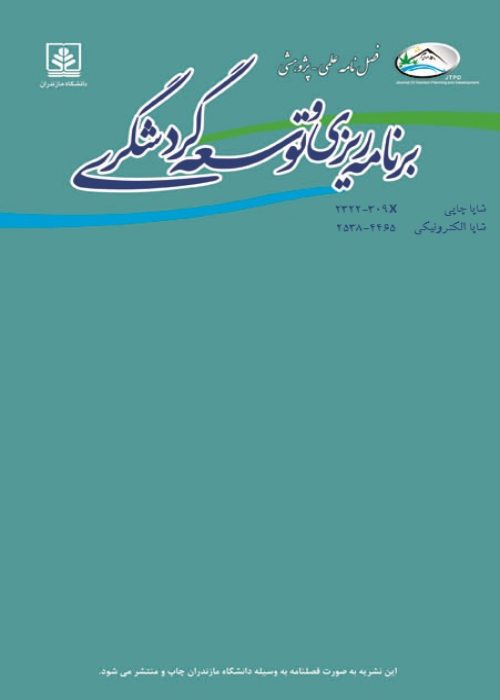A Sociological Study of Tourist's Adherence to Social Norms
Author(s):
Abstract:
Introduction
'Norm' is a Latin word and it means a principle or a rule which we refer to in actions, the word norm conceptually involves rules and principles which are required to guide and lead human behavior (Mooney, Konx & Schacht, 2,. 2000: 249). Regarding tourist attractions of Mazandaran province, the city which has attracted many tourists, is one of main tourists` destinations. Tourists who do not perpetually reside in destination communities sometimes it is assumed that they do not follow norms in the destination community. The results of a number of domestic studies also indicate that there are increasing rate of crimes (Zahedi, 2006), crimes alongside with social deviance (Karimi, 2013), or social-cultural irregularities (Taghdisi et al., 2012; Ebrahimi, 2011) and use of drug and alcohol (Zia`ee & Torabian, 2010) in tourist seasons in some regions. Therefore the study aims at realizing the rate of faithfulness to norms within tourists of Mazandaran cities and understanding the point that what factors make tourists to follow social norms in the destination society.
Theoretical framework: In the social norms part as dependent variables, Elster theory is used to specify the concept of norm. Different aspects of norm such as consumption norms, anti-behavioral norms, reciprocal norms, companionship norms are taken into account as dependent variables. And in the second part we consider different factors which play role in actors following norms. In this study we extracted the hypothesis with this approach in a way that how an individual carries out a group`s wishes in following the social norms and how the group can force the individual to follow the norms.
Methodology
Methodologically, for this subject with survey research and questionnaire the needed data were gathered out of 300 individuals of Mazandaran tourists who were chosen with the multiphase cluster sampling method. To ensure the validity of the questionnaire the face validity and to examine the validity Cronbach alpha were used. The SPSS software was used to analyze the data and collected information. Discussion and findings:The comparison of the mean aspects of the norm indicates that the norm average of reciprocal action for women was 5.0 and for men was 4.9. There was a slight difference between men and women. There is no difference in the average of companionship norm of men and women. The average of consumption norm for women was 4.5 and for men was 4.3 which indicates a difference in this aspect. The average of anti-behavioral norm in women and men equals 4.2 and show no difference. Examining the average of men and women`s gained marks reveals that between the aspects of social norms (reciprocal norms, companionship norms, anti-behavioral norms) the difference in the gained marks of tourist men and women in faithfulness to social norms is not meaningful; but in the consumption norms, the average of gained marks of women (21.7) was higher than men`s (21.2); therefore, it can be said that the average of consumption norms of men and women has a meaningful difference. The hypothesis women are more faithful to the norms than men is confirmed regarding gained 0.003 meaningfulness level of gender and total social norms. Multiple correlation coefficient (R) is 0.458 which indicates the correlation and relation of five independent variables with dependent variable "social norm".
Coefficient of determination (R2) is also calculated 0.21 revealing that about 21 per cent of "social norm" changes are conducted by mentioned five variables and the rest 79 per cent relates to the other factors which are not examined in this study. Only the inter-group attitude panic variable among the five variables had no meaningful relationship with "social norm". Group commitment variables with standardized coefficient (0.24 of coefficient standardized), social correlation (0.17 of coefficient standardized), rationality (0.14 of coefficient standardized) and inter-group relationships (0.17 of coefficient standardize) are the strongest predictors of "social norm" respectively.
Conclusion
The first hypothesis claims that faithfulness to social norm is a positive function of inter-group relationships. This hypothesis is confirmed. This variable could predict 12 per cent of dependent variable changes alongside other variables. The second hypothesis claims that faithfulness to social norm is a positive function of social correlation which is confirmed regarding its meaningfulness level. This variable could specify 0.17 of dependent variable changes. The hypothesis number 3 believes faithfulness to norms is a positive function of social commitment which regarding the results this hypothesis is confirmed and is generalizable to statistical population. The results of regression model shows that regarding the measurement of this variable among other variables, it has the most relative effect on specifying the dependable variable (faithfulness to norm). This variable has the most part (0.24 per cent) in specifying the dependant variable and can predict 24 per cent of dependent variable changes among other variables.The fifth hypothesis claims faithfulness to social norm is a positive function of rationality. This hypothesis is confirmed. This variable could predict 14 per cent of dependent variable changes alongside other variables.
Keywords:
Norm , Faithfulness , Social Factors , Mazandaran , Tourist
Language:
Persian
Published:
Journal of Tourism Planning and Development, Volume:5 Issue: 16, 2016
Pages:
168 to 187
magiran.com/p1548862
دانلود و مطالعه متن این مقاله با یکی از روشهای زیر امکان پذیر است:
اشتراک شخصی
با عضویت و پرداخت آنلاین حق اشتراک یکساله به مبلغ 1,390,000ريال میتوانید 70 عنوان مطلب دانلود کنید!
اشتراک سازمانی
به کتابخانه دانشگاه یا محل کار خود پیشنهاد کنید تا اشتراک سازمانی این پایگاه را برای دسترسی نامحدود همه کاربران به متن مطالب تهیه نمایند!
توجه!
- حق عضویت دریافتی صرف حمایت از نشریات عضو و نگهداری، تکمیل و توسعه مگیران میشود.
- پرداخت حق اشتراک و دانلود مقالات اجازه بازنشر آن در سایر رسانههای چاپی و دیجیتال را به کاربر نمیدهد.
In order to view content subscription is required
Personal subscription
Subscribe magiran.com for 70 € euros via PayPal and download 70 articles during a year.
Organization subscription
Please contact us to subscribe your university or library for unlimited access!


